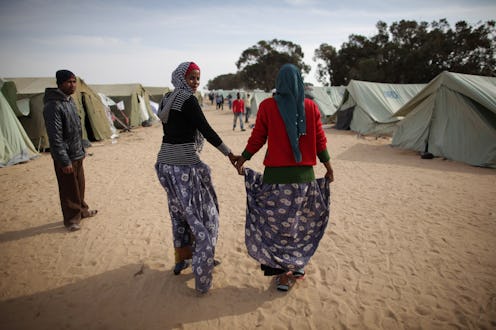News
Somali Woman Jailed For Reporting Rape
Bad news out of Somalia on Monday, where a court in Mogadishu sentenced a woman to a suspended six-month prison sentence... for reporting that she'd been sexually assaulted. The court also sentenced two journalists, who reported on the victim's story, to prison sentences; these may be truncated if they pay a fine for early release. The victim, also a journalist and working for a United Nations-funded station, was found guilty of defamation and lying, and will serve out her sentence at home. And to think that there are places where the Steubenville handling of a sexual assault would've been an improvement...
Monday’s sentencing in the capital city of Mogadishu was at least the second this year in which a woman was punished for coming out about rape. The young journalist told her colleagues that two other journalists — employees of a state-run station, Radio Mogadishu — attacked her and raped her at gunpoint. Though the United Nations called for a “proper investigation,” the two men she accused were never arrested.
One of the journalists who reported the case, Abdilmalik Yusuf, works for the network Radio Shabelle. Yusuf was given a prison term of one year for “offending state institutions.” Another journalist, Mohamed Bashir, was given six months for “defamation and making false rape accusations.” However, the men can be released early for paying a fine that comes out to roughly one dollar per day of their prison term. (That’s a large sum in the war-torn nation.)
This is hardly the first time this has happened. In February, another sexual assault survivor and a journalist were sentenced to yearlong prison terms in Somalia for “offending state institutions,” before an international outcry got them a suspended sentence. A woman who said she was gang-raped by African Union soldiers was detained for questioning in August, and, though she hasn’t been jailed, the case is not moving forward.
The government’s response is hampered by widely disparate numbers from different groups reporting sexual assault statistics, and, it says, by false allegations by those looking for medical treatment. The root of the issues also lies in deep-seated social mores, which are likely to get even more conservative with the growing threat from radical groups.
“Anything involving sex is hard to cover in Somalia. It is easier to speak to bomb victims than rape victims,” Mohamed Mohamud Dahir, a SKY FM presenter, told Al Jazeera. “If you interview her and people know who the victim is, she will be stigmatised and may never find a husband — or she may even be disowned by the society.”
Though sexual assault might not be the primary concern of the Somali government at the moment — with the country, if it can still be called that, harboring a growing al-Shabaab militant movement — the callousness with which these cases are handled is cause for international concern. More than simply ignoring the accusations, the label slapped on so many of these allegations is one of “offending state institutions." As if a woman speaking up about a violation is an attack on the state itself. And that alone should warrant international pressure to do something.
